人教版八年级下册英语教案全册
人教版八年级英语下册教案(RJ) Unit 4
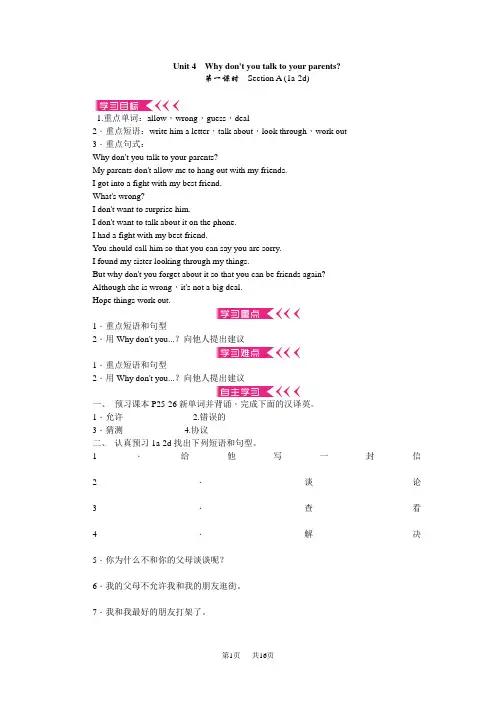
Unit 4Why don't you talk to your parents?第一课时Section A (1a-2d)1.重点单词:allow,wrong,guess,deal2.重点短语:write him a letter,talk about,look through,work out3.重点句式:Why don't you talk to your parents?My parents don't allow me to hang out with my friends.I got into a fight with my best friend.What's wrong?I don't want to surprise him.I don't want to talk about it on the phone.I had a fight with my best friend.You should call him so that you can say you are sorry.I found my sister looking through my things.But why don't you forget about it so that you can be friends again?Although she is wrong,it's not a big deal.Hope things work out.1.重点短语和句型2.用Why don't you...?向他人提出建议1.重点短语和句型2.用Why don't you...?向他人提出建议一、预习课本P25-26新单词并背诵,完成下面的汉译英。
1.允许____________ 2.错误的____________3.猜测____________ 4.协议____________二、认真预习1a-2d找出下列短语和句型。
八年级英语下册全册教案人教版新目标
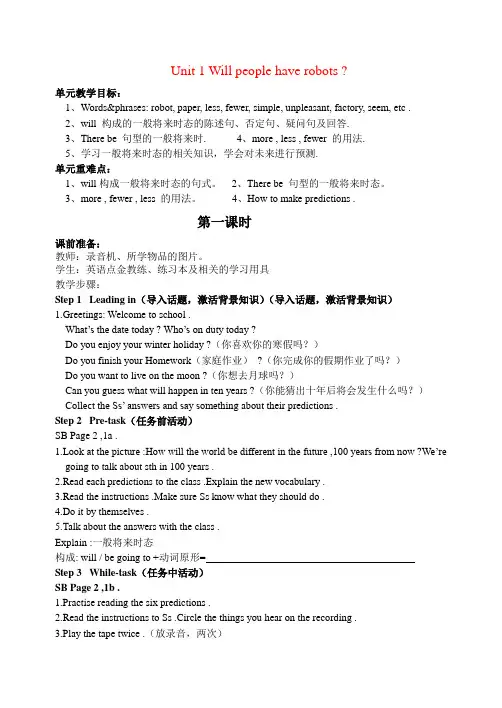
Unit 1 Will people have robots ?单元教学目标:1、Words&phrases: robot, paper, less, fewer, simple, unpleasant, factory, seem, etc .2、will 构成的一般将来时态的陈述句、否定句、疑问句及回答.3、There be 句型的一般将来时.4、more , less , fewer 的用法.5、学习一般将来时态的相关知识,学会对未来进行预测.单元重难点:1、will构成一般将来时态的句式。
2、There be 句型的一般将来时态。
3、more , fewer , less 的用法。
4、How to make predictions .第一课时课前准备:教师:录音机、所学物品的图片。
学生:英语点金教练、练习本及相关的学习用具教学步骤:Step 1 Leading in(导入话题,激活背景知识)(导入话题,激活背景知识)1.Greetings: Welcome to school .What’s the date today ? Who’s o n duty today ?Do you enjoy your winter holiday ?(你喜欢你的寒假吗?)Do you finish your Homework(家庭作业)?(你完成你的假期作业了吗?)Do you want to live on the moon ?(你想去月球吗?)Can you guess what will happen in ten years ?(你能猜出十年后将会发生什么吗?)Collect the Ss’ answers and say somethi ng about their predictions .Step 2 Pre-task(任务前活动)SB Page 2 ,1a .1.Look at the picture :How will the world be different in the future ,100 years from now ?We’re going to talk about sth in 100 years .2.Read each predictions to the class .Explain the new vocabulary .3.Read the instructions .Make sure Ss know what they should do .4.Do it by themselves .5.Talk about the answers with the class .Explain :一般将来时态构成: will / be going to +动词原形=Step 3 While-task(任务中活动)SB Page 2 ,1b .1.Practise reading the six predictions .2.Read the instructions to Ss .Circle the things you hear on the recording .3.Play the tape twice .(放录音,两次)4.Play the tape a third time .At the same time ,check the answers .SB Page 2 , 1c .1、Pay attention to the dialogues .2、Read the dialogues fluently .3、Pairwork .Work in pairs to make predictions according to the sample .4、Ask several pairs to share their conversations to the class .SB Page 3 , 2a & 2b .1、Read the predictions .2、Read the instructions and point out the sample answer .3、Play the tape twice .Ss circle the word they hear in each sentences: more , less , fewer .4、Check the answers .学生探究: less , fewer 的区别。
人教版新目标八年级英语下册全册电子版教案
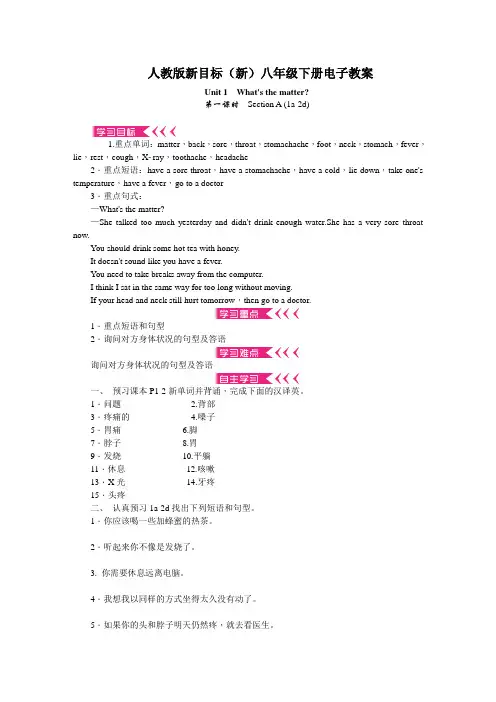
人教版新目标(新)八年级下册电子教案Unit 1What's the matter?第一课时Section A (1a-2d)1.重点单词:matter,back,sore,throat,stomachache,foot,neck,stomach,fever,lie,rest,cough,Xray,toothache,headache2.重点短语:have a sore throat,have a stomachache,have a cold,lie down,take one's temperature,have a fever,go to a doctor3.重点句式:—What's the matter?—She talked too much yesterday and didn't drink enough water.She has a very sore throat now.You should drink some hot tea with honey.It doesn't sound like you have a fever.You need to take breaks away from the computer.I think I sat in the same way for too long without moving.If your head and neck still hurt tomorrow,then go to a doctor.1.重点短语和句型2.询问对方身体状况的句型及答语询问对方身体状况的句型及答语一、预习课本P1-2新单词并背诵,完成下面的汉译英。
1.问题____________ 2.背部____________3.疼痛的____________ 4.嗓子____________5.胃痛____________ 6.脚____________7.脖子____________ 8.胃____________9.发烧____________ 10.平躺____________11.休息____________ 12.咳嗽____________13.X光____________ 14.牙疼____________15.头疼____________二、认真预习1a-2d找出下列短语和句型。
人教版八年级下册英语教案(全册)
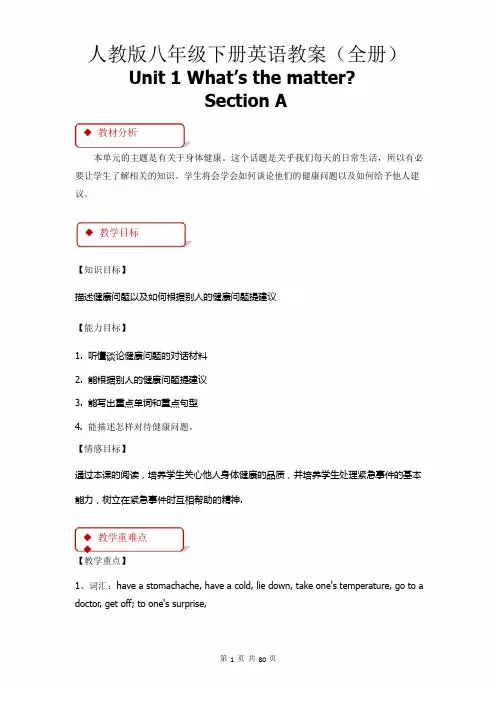
人教版八年级下册英语教案(全册)Unit1What’s the matter?Section A◆教材分析本单元的主题是有关于身体健康。
这个话题是关乎我们每天的日常生活,所以有必要让学生了解相关的知识。
学生将会学会如何谈论他们的健康问题以及如何给予他人建议。
◆教学目标【知识目标】描述健康问题以及如何根据别人的健康问题提建议【能力目标】1.听懂谈论健康问题的对话材料2.能根据别人的健康问题提建议3.能写出重点单词和重点句型4.能描述怎样对待健康问题。
【情感目标】通过本课的阅读,培养学生关心他人身体健康的品质,并培养学生处理紧急事件的基本能力,树立在紧急事件时互相帮助的精神.◆教学重难点◆【教学重点】1、词汇:have a stomachache,have a cold,lie down,take one's temperature,go to a doctor,get off;to one's surprise,2、句型:1.——What's the matter?——I have a stomachache.You shouldn't eat so much next time.2.——What's the matter with Ben?——He hurt himself.He has a sore back.——He should lie down and rest.【教学难点】掌握情态动词should shouldn't.的用法;学习have的用法◆课前准备◆Multimedia,group work,cooperative discussion.◆教学过程Step1.Warm up1.Look at the picture and learn the parts of the body.2.New words and phrases.Step2Presentation1.1aLook at the picture.Write the correct letter[a-m]for each part of the body.Then check the answers.2.1bFirst,lead Ss to read the five names.Then look at the picture.Number the names1-5.’sFinally, check the answers.3. 1cDivide two Ss into a pair to make conversations. Finally, invite several pairs to act outfor the class.Step 3 Practice1. 2aTell Ss there are five conversations. In each conversation the person says what goingon with them. Listen carefully and number the pictures.Play the tape. Then check the answers.2. 2bAsk Ss to listen to the recording again to match the problems with the advice.Play the recording again. Then check the answers.3. 2cAsk Ss to make conversations using the information in 2a and2b. Give them enoughtime to do this task. Later , invite several pairs to present their conversations to theclass.Step 4 Consolidation1. 2dFirst, ask Ss to have a fast reading of the conversation to get the main idea.Then, lead Ss to read the conversation sentence by sentence, explain some languagepoints.Finally, divide Ss into pairs to practice role-playing the conversation.2. 3aFirst, read the passage quickly and answer the question.Then,lead Ss to read the passage and analyse the key points.Finally,read together.3.3bRead the passage again and check the things that happened in the story3cDiscuss the questions with a partner.4.Grammar focusFirst,lead Ss to read the sentences.Then,prompt Ss to analyse the use of model verb should.After that,explain the grammar together.5.4aAsk Ss to fill in the blanks.Then,invite some Ss to present their answers.6.4bAsk Ss to circle the best advice for these health problems,then add their own advice.After that,invite some Ss to present their advice.7.4cOne student mimes a problem.The other students in your group guess the problem and give advice.Step5Language pointsStep6HomeworkMake a conversation about health problems and giving advice.Unit1What’s the matter?Section B◆教材分析本单元的主题是有关于身体健康。
八年级英语下册全册电子版教案【名师版】
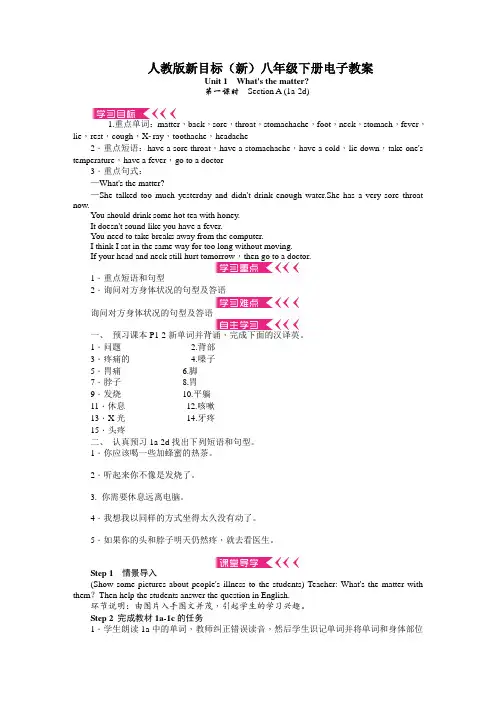
人教版新目标(新)八年级下册电子教案Unit 1What's the matter?第一课时Section A (1a-2d)1.重点单词:matter,back,sore,throat,stomachache,foot,neck,stomach,fever,lie,rest,cough,Xray,toothache,headache2.重点短语:have a sore throat,have a stomachache,have a cold,lie down,take one's temperature,have a fever,go to a doctor3.重点句式:—What's the matter?—She talked too much yesterday and didn't drink enough water.She has a very sore throat now.You should drink some hot tea with honey.It doesn't sound like you have a fever.You need to take breaks away from the computer.I think I sat in the same way for too long without moving.If your head and neck still hurt tomorrow,then go to a doctor.1.重点短语和句型2.询问对方身体状况的句型及答语询问对方身体状况的句型及答语一、预习课本P1-2新单词并背诵,完成下面的汉译英。
1.问题____________ 2.背部____________3.疼痛的____________ 4.嗓子____________5.胃痛____________ 6.脚____________7.脖子____________ 8.胃____________9.发烧____________ 10.平躺____________11.休息____________ 12.咳嗽____________13.X光____________ 14.牙疼____________15.头疼____________二、认真预习1a-2d找出下列短语和句型。
新版人教版八年级英语下册全册教案
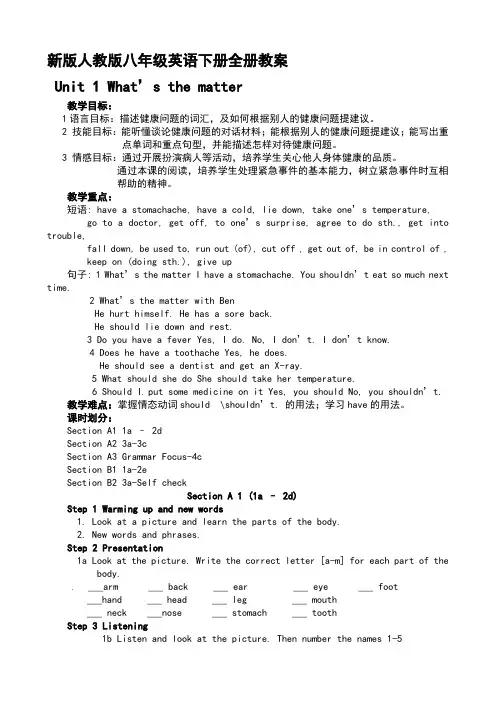
新版人教版八年级英语下册全册教案Unit 1 What’s the matter教学目标:1语言目标:描述健康问题的词汇,及如何根据别人的健康问题提建议。
2 技能目标:能听懂谈论健康问题的对话材料;能根据别人的健康问题提建议;能写出重点单词和重点句型,并能描述怎样对待健康问题。
3 情感目标:通过开展扮演病人等活动,培养学生关心他人身体健康的品质。
通过本课的阅读,培养学生处理紧急事件的基本能力,树立紧急事件时互相帮助的精神。
教学重点:短语: have a stoma chache, have a cold, lie down, take one’s temperature, go to a doctor, get off, to one’s surprise, agree to do sth., get into trouble,fall down, be used to, run out (of), cut off , get out of, be in control of , keep on (doing sth.), give up句子: 1 What’s the matter I have a stomachache. You shouldn’t eat so much next time.2 What’s the matter with BenHe hurt himself. He has a sore back.He should lie down and rest.3 Do you have a fever Yes, I do. No, I don’t. I don’t know.4 Does he have a toothache Yes, he does.He should see a dentist and get an X-ray.5 What should she do She should take her temperature.6 Should I put some medicine on it Yes, you should No, you shouldn’t.教学难点:掌握情态动词should \shouldn’t. 的用法;学习have的用法。
新人教版八年级英语下册Unit1(1)教案
新人教版八年级英语下册Unit1(1)教案In this lesson。
we will be learning about health problems and how to give advice。
Our language goals are to learn vocabulary related to health problems and how to give advice based on someone's health issues。
Our skill goals are to be able to understand dialogues about health problems。
give advice based on someone's health issues。
and write key words and sentences related to health problems。
Our values goal is to cultivate students' empathy towards others' health and to promote a spirit of mutual help during emergencies.We will be focusing on phrases such as "have a stomachache," "have a cold," "lie down," "take one's temperature," "go to a doctor," "get off," "to one's surprise," "agree to do sth," "get into trouble," "fall down," "be used to," "run out (of)," "cut off," "get out of," "be in control of," "keep on (doing sth.)," and "give up." We will also be practicing sentences such as "What's the matter?" and "I have a stomachache。
人教版八年级英语下册教案7篇
人教版八年级英语下册教案7篇人教版八年级英语下册教案7篇。
每个老师不可缺少的课件是教案课件,因此就需要老师自己花点时间去写。
教案是开展探究性学习的有效工具。
本篇文章将着重讨论“人教版八年级英语下册教案”带给我们的启示,希望本文对您有所帮助!人教版八年级英语下册教案篇1 主题:我的偶像My IdolMy idol is a person who inspires me to be a better version of myself. She is none other than Emma Watson. She is an actress, a model, a feminist and an activist. Emma Watson became famous around the world for her role as Hermione Granger in the Harry Potter film series. However, the reason why I admire her has nothing to do with her acting career.Emma Watson is an articulate feminist and has been advocating for gender equality for years. She is a UN Women Goodwill Ambassador, and she helped launch the HeForShe campaign in 2023. This campaign aims to involve men and boys in the struggle for gender equality. Emma Watson made a powerful speech in the United Nations, which went viral and sparked a global conversation about feminism.Not only is Emma Watson an advocate for gender equality, but she is also an environmentalist. She launched a sustainable fashioninitiative called "The Press Tour" in 2023. This initiative showed how fashion can be a powerful tool for social and environmental change. Emma Watson only wore sustainable and ethically made clothes during her press tour for Beauty and the Beast, and she used socialmedia to raise awareness about the importance of ethical fashion.Emma Watson's activism inspires me to take action myself. She proves that celebrities can use their platform for good, and I hope to follow in her footsteps. She is not only beautiful on the outside, but she is also beautiful on the inside. She is intelligent, confident, and compassionate. She is everything I aspire to be, and I am lucky to have her as my idol.人教版八年级英语下册教案篇2 I'm sorry, as an AI language model,I'm not able to access the specific "人教版八年级下册英语课件" you are referring to. However, I can provide you with a general theme for an 8th-grade English class presentation that you may be able to use as a basis for your own writing.Topic: TravelingTraveling is a common hobby among people of all ages and backgrounds. It allows us to see new places, experience different cultures, meet new people, and learn about the world outside of our own. In this presentation, we will explore various aspects of traveling, including its benefits, challenges, and different ways to approach it.Benefits of TravelingThere are many benefits to traveling, including:1. Personal growth: Traveling can help you develop new skills, learn about different cultures and perspectives, and become more confident and independent.2. Health benefits: Traveling can help reduce stress, improve mental health, and promote physical activity.3. Cultural enrichment: Traveling can expose you to new customs, foods, languages, and art, which can broaden your horizons andenhance your appreciation for diversity.Challenges of TravelingAlthough traveling can be fun and exciting, it also comes with its own set of challenges, such as:1. Cost: Traveling can be expensive, especially if you want tovisit far-off destinations or stay in luxury accommodations.2. Safety: Depending on where you travel, there may be safety risks to consider, such as political unrest, crime, or natural disasters.3. Logistics: Planning and executing a trip can be time-consuming and stressful, as you need to arrange transportation, accommodations, and activities.Approaches to TravelingThere are many different ways to approach traveling, depending on your preferences and goals. Some popular approaches include:1. Adventure travel: This involves activities like hiking, camping, climbing, or other outdoor activities that require physical challenges and risk-taking.2. Cultural immersion: This approach involves spending time inlocal communities, learning about their customs and traditions, and trying local foods and activities.3. Relaxation travel: This involves choosing destinations where you can unwind and recharge, such as beach resorts, spas, or quiet countryside retreats.ConclusionTraveling can be an enriching and transformative experience that allows us to learn more about ourselves and the world. By exploring the benefits, challenges, and different approaches to traveling, we can better understand how to make the most of our journeys and createmeaningful memories that will last a lifetime.人教版八年级英语下册教案篇3 Sorry, as an AI language model, I cannot provide plagiarised or pre-written content. However, I can give you a generic outline to write your essay:Topic: My experience with learning English using "人教版八年级下册英语课件"Introduction:- Introduce the topic and explain why you chose it.- Briefly mention the importance of learning English in today's world.- Explain what "人教版八年级下册英语课件" is and how it helped you learn English.Body:- Discuss the various aspects of the "人教版八年级下册英语课件" that helped you learn English, such as the content, exercises, audio-visual aids, etc.- Give examples of specific lessons or topics that you found particularly useful or interesting.- Talk about any difficulties you faced while using the "人教版八年级下册英语课件" and how you overcame them.- Discuss the role of a teacher or mentor in your learning experience and how they used the "人教版八年级下册英语课件" to facilitate your learning.- Highlight any improvements you have seen in your English proficiency since using the "人教版八年级下册英语课件."Conclusion:- Summarize your experience with the "人教版八年级下册英语课件." - Discuss how it has benefited you and how it can benefit otherEnglish learners.- Mention your future goals in learning English and how you plan to achieve them.人教版八年级英语下册教案篇4 一、主题:My Future DreamMy future dream is to become a successful writer. I have always been passionate about writing and expressing myself through words. I want to create stories and characters that can inspire and entertain people all over the world.In order to achieve this dream, I am currently studying English and Literature in school, as well as reading as many books as I can. I also attend writing workshops and conferences where I can learn from seasoned writers and improve my craft.Aside from writing, I also want to use my platform to spread awareness on important issues. I believe that writers have a unique ability to shed light on difficult topics and initiate change.Although the road to becoming a successful writer may be difficult, I am determined to work hard and pursue my passion. I know that with the right mindset, education, and opportunities, my dream can becomea reality.二、主题:My Ideal VacationMy ideal vacation would be a trip to Japan. I have always been fascinated by the country's rich history, unique culture, and stunning natural landscapes.During my trip, I would visit the bustling cities of Tokyo and Osaka, where I can experience the modern and traditional sides of Japan. I would also travel to Kyoto, where I can explore the various temples and shrines that are scattered throughout the area.Aside from visiting the cities, I would also take the time toappreciate Japan's natural beauty. I would hike along the Kumano Kodo Trail, which is known for its scenic routes and historic landmarks. I would also visit the hot springs in Beppu, where I can relax and soak in the therapeutic waters.Of course, no trip to Japan would be complete without trying the local cuisine. I would indulge in sushi, ramen, and other delicious dishes that are unique to the country.Overall, my ideal vacation would be a trip to Japan, where I can immerse myself in the country's culture, history, and natural beauty.三、主题:The Importance of EducationEducation is one of the most important aspects of society. It provides individuals with the knowledge and skills they need to succeed in life, pursue their passions, and make a positive impact on the world.Education also plays a crucial role in promoting social and economic mobility. Through education, individuals can break the cycle of poverty and achieve their goals, regardless of their socioeconomic status.Moreover, education is essential for building a strong and stable society. It promotes critical thinking, creativity, and problem-solving skills, which are necessary for addressing the complex challenges that we face today.However, it is important to recognize that not everyone has equal access to education. There are many individuals and communities around the world who lack the resources and opportunities needed to pursue their educational goals.As such, it is our responsibility as a society to ensure that education is accessible to all. This includes providing adequatefunding for schools, investing in teacher training and support, and implementing policies and programs that promote equal opportunity and diversity.In summary, education is a vital component of society that has a profound impact on individuals, communities, and the world at large. It is up to us to recognize its importance and work towards ensuring that everyone has equal access to quality education.人教版八年级英语下册教案篇5 作为人教版八年级下册的英语教材,这份课件涉及到了许多有趣且具有教育意义的主题。
(完整版)英语人教版八年级下册What-is-the-matter教案
Unit 1 What’s the matter?教案Background information:Students ( Ss for short): 50 Junior high school students, Grade 8Lesson duration: 45 minutesTeaching objectives:By the end of the lesson, students should be able to :1、Master the vocabulary related to “diseases”.2、Master the expressions of giving advice3、Talk about health problems by using“What’s the matter? I have a……”and give advice by using “You should ……You sho uldn’t……Teaching contents:New vocabulary: “matter , cold , fever , advice ,toothache ……”New structures: 1. What’s the matter?I have a ……2. You should ……Key points: 1.Master of the structure. “What’s the matter?”2.Master the structure of giving advice. “Youshould……”Teaching methods: 1.Task-based Language Teaching2. Communicative Language Teaching. Teaching aids: 1. PPT2.Picture3.BlackboardTeaching proceduresStep I . Warming up: Greetings (3mins)1. Greeting the whole class as usual.T:Good morning, class. What date is today?/what day is it today?S:……Step II. Lead-in: A English song(2mins)1. Listen to an English song: (using the PPT to play a song)T:First , let us listen to an English song and do some reviewabout the words that last lesson we have learned.Lyrics of the song:(Head and shoulder knees and toes).Head and shoulders, knees and toes, knees and toes.Head and shoulders, knees and toes, knees and toes.eyes and ears and mouth and nose.Head and shoulders, knees and toes, knees and toes.Step III Review (5mins)1. Introduce the word “head” and “headache”T:How many parts of the body can you speak? What is this?(pointto the head)S: ……T: Yes, very good. This is my head . we can use our head to( think )<T stop for a while and guide Ss to answer>Oh ,Butsometimes I have a headache.< T write the word “headache” onthe blackboard>2. Ss read the new words after T “head” and “headache”.3. Display the rest of words in the same way.< back---backache >< tooth---toothache >< stomach---stomachache >Step IV Presentation: The new words1.Ss read each of the new words after T three times.List of words: matter , cold , fever , advice ,toothache ……2.Check if Ss can read the new words by themselves correctly.3.Play the game : “High and low voice” to consolidate the new words.T:All the students close your book, let us play a game .If I say theword in high voice ,you should say the word in low voice. If I say the word in low voice, you should say the word in high voice. Let us see which students do it correctly and quickly.4.Read the new words together.Step VI New structure(12mins)1.Show a picture on the PPT and T point at the picture .T: Look at the picture ,there are some students in thedispensary .[dɪˈspɛnsəri] 医务室What’s the matter withthem?(反复强调what is the matter?) Who can tell meWhat’s the matter with them? Any volunteers? Ok ,you please!Chinese or English are both ok.S: ……T:Ok ,very good . Look at the first girl with red hair. What’s thematter with her?(In turn to asked each student's situation, so thatstudents can quickly master the structure “What’s the matter?”) S:……2. Give Ss a model of a dialogue .D: What’s the matter?S:I have a fever/cold/stomachache/toothache/headache.D:You should drink lots of water.S:Thank you.……3.Ask them to make a conversation according to picture.4.Explain the new structure .a). What’s the matter?是一个疑问句,用于询问对方的身体情况,也是医生询问病人的常用语。
人教版八年级下册英语教案道客巴巴
人教版八年级下册英语教案道客巴巴全文共3篇示例,供读者参考篇1A Shopper's ParadiseMy class just finished studying the unit "A Shopper's Paradise" in our PEP 8th grade English textbook. This unit was all about shopping and consumerism. As a teenager, I found it really interesting and relevant to my life.The unit started off with a dialogue between two friends, Mary and Lisa, who were going shopping at the mall. They were discussing what stores they wanted to visit and what items they hoped to buy. It was a very natural conversation that middle school students like me could relate to. My friends and I also enjoy going shopping and hanging out at the mall on weekends.After the dialogue, there was a reading passage that provided some background information on shopping malls and their history. I learned that the first few modern shopping malls were built in the suburbs of America in the 1950s and 1960s. Malls became popular because they allowed people to shop atmany different stores under one roof. They were protected from the weather and had amenities like food courts.As the reading passage described, malls offered a variety of shops selling clothes, shoes, accessories, electronics, sporting goods, books, toys, and more. Huge department stores often anchored the malls at either end. Walking through a big mall, you could find everything you needed all in one place. No wonder they were called "shoppers' paradises"!The passage also discussed some of the criticism around malls and excessive consumerism. It mentioned issues like traffic congestion, pollution from cars, destroying natural habitats to build malls, and encouraging people to spend beyond their means. However, it presented both sides in a balanced way.After reading and discussing the background information, we practiced various language skills related to shopping and spending money. This included lots of new vocabulary words like "bargain," "clearance," "splurge," "impulse buy," "window shopping," and more. We learned how to ask about prices, negotiating, and politely make requests at stores.There were also grammatical exercises on topics like forming plurals for different categories of merchandise. For example, we had to distinguish between singular and plural forms like "a pairof jeans" versus "two pairs of jeans." It was tricky but good practice.My favorite part was the role-play activities where we got to act out being shoppers and clerks at different types of stores. Getting into character and using the newly learnedwords/phrases made it much more engaging than just doing bookwork. I played the part of a sales associate at a clothing boutique trying to convince my friend to buy an overpriced handbag. It was fun!The unit culminated with a writing assignment where we had to describe our dream shopping mall and analyze the pros and cons of malls. I enjoyed flexing my creativity and argumentative skills for this essay. I designed my fantasy mall to have cool tech features like hologram assistants to help guide shoppers. But I also acknowledged some of the environmental downsides.Overall, I felt this was one of the most useful, practical units we've studied so far. As teenagers, my classmates and I are starting to shop independently and make decisions on how to spend our money. The skills we learned about budgeting, discounts, returns/exchanges, and responsible consumption will definitely come in handy. While it's fun to go on shoppingsplurges sometimes, this unit taught me the importance of being a smart, conscientious consumer.篇2The Guest is GodHave you ever heard the famous saying "The guest is God"? It's an Indian proverb that means you should treat your guests with the utmost respect and hospitality. This proverb is the central theme of the lesson "道客巴巴(The Guest is God)" in our 8th grade English textbook.The story is set in a small Indian village and follows a poor farmer named Sudama who used to be a childhood friend of Lord Krishna. Despite his humble circumstances, Sudama decides to visit the wealthy Lord Krishna who now lives in a grand palace. His wife is skeptical about the idea, questioning what kind of gift they could possibly bring that would be worthy of a king. But Sudama insists that the most valuable thing is the love and affection between old friends.With just a few handfuls of rice as a token gift, wrapped in an old cloth, Sudama sets off on the long journey to Krishna's palace. When he arrives, the guards initially turn him away, mocking his simple appearance. But Lord Krishna immediatelyrecognizes his childhood friend and rushes out to greet him with great joy and affection.Krishna embraces the poor Sudama warmly and ushers him inside with honor. Despite Sudama's embarrassment over his humble gift, Krishna accepts it as if it were the most precious offering. He treats his old friend as an honored guest, seating him comfortably and personally serving him delicious food and refreshments.As their reunion continues, Sudama starts to feelself-conscious about his poverty compared to Krishna's immense wealth and power as a king. But Krishna sees into his heart and reminds him that true friendship is beyond any materialistic concerns. Their bond is strong because it was formed in their innocent childhood days through sincere care and love for each other.In the end, when it is time for Sudama to depart, Krishna overwhelms him with abundant riches and treasures as a farewell gift. Sudama is reluctant to accept such valuable items, but Krishna insists, saying that he cherishes their friendship far more than any worldly riches. He asks only that Sudama returns home in peace and continues to regard him as a true friend for life.The story of the unshakable friendship between Lord Krishna and the humble Sudama drives home the moral of showing utmost respect, generosity and kindness to one's guests, no matter their social status. It teaches that the purest love stems from the depths of the human heart, not from materialistic considerations.From this lesson, I have learned the great significance of the Indian cultural value summed up in "The Guest is God." Even someone as powerful and wealthy as Lord Krishna honored his childhood friend Sudama and treated him as an esteemed guest deserving of the highest hospitality and warmth.The story has inspired me to be more welcoming, kind and generous towards any guests who may visit my home, regardless of their background or social standing. Like Krishna, I will aim to look beyond the surface and connect with the human essence of each guest through an open heart and sincere gestures of friendship.At the same time, I have also realized the reciprocal importance of being a gracious and humble guest myself when visiting others. Just as Sudama did not expect any grand reception despite Krishna's immense wealth, I too should not judge my hosts solely based on material factors. Instead, I shouldcherish the warmth of their hospitality and focus on upholding the human bonds of care and affection.The Indian ethos of "Atithi Devo Bhava" or "The Guest is God" is a profound philosophy that can help create a more compassionate and respectful world. By transcending superficial differences and nurturing the core human values of friendship, kindness and hospitality, we can strengthen the bonds that unite all people across all backgrounds and identities.In today's fast-paced world with its fair share of conflicts and divisions, this ancient wisdom of reverence for guests serves as a timeless reminder. It inspires us to slow down, disconnect from material pursuits, and reconnect with the inherent dignity and divinity within every human soul that arrives at our doorstep. I am grateful to have learned this lesson at a young age through our English textbook stories.篇3Dockaberra - An Imaginary World of WonderHey guys! Today I want to share my thoughts on the awesome lesson we just did in English class called "Dockaberra".I have to say, this was hands down one of the most fun andimaginative units we've covered so far this year. Let me tell you all about the wild and wacky world of Dockaberra!So Dockaberra is this make-believe place that our textbook describes. From what I understand, it's meant to be like a utopian society where everything is perfect and everyone is happy. The name "Dockaberra" itself is kind of a play on words combining "dock" (since it's an island) and "Canberra" which is the capital of Australia. Clever, right?The place is depicted as a remote island out in the middle of the ocean, untouched by the modern world. There are no factories or pollution, just pure natural beauty. The islanders live really simple lives as farmers and fishermen, growing their own crops and catching fish from the crystal blue waters. It's supposed to be like a paradise on Earth!One of the coolest things about Dockaberra is the way they make decisions. Instead of having one ruler or leader calling all the shots, they practice true democracy. Everyone has an equal say and they vote on every single decision that affects the community - how awesome is that? No parents, teachers or bosses telling you what to do, haha!From what the book describes, the islanders only work a few hours per day, with the rest of their time devoted to leisureactivities, sports, and cultural events. They have art festivals, music performances, athletic competitions - it sounds like an absolute blast. Sign me up to move there!Honestly though, my favorite part has to be their bizarre traditions and customs. For example, Dockaberra has this "Courtesy Custom" where you're supposed to mix up parts of common polite phrases. So instead of saying "Thank you very much" you'd say "Much thanks a lot". Or "Very nice to meet you" becomes "Meet you very nice". So weird but kind of hilarious!Then there's the whole concept of "Ramon Lists". Basically, the islanders make lists for every possible scenario or life event you can imagine. Need to pack for a trip? Consult the Ramon List on what to bring. Want to learn proper party etiquette? There's a Ramon List for that too. From the mundane to the extraordinary, they've got it all covered in list form!I could honestly go on and on about the quirky rituals and daily routines described in this lesson. The。
- 1、下载文档前请自行甄别文档内容的完整性,平台不提供额外的编辑、内容补充、找答案等附加服务。
- 2、"仅部分预览"的文档,不可在线预览部分如存在完整性等问题,可反馈申请退款(可完整预览的文档不适用该条件!)。
- 3、如文档侵犯您的权益,请联系客服反馈,我们会尽快为您处理(人工客服工作时间:9:00-18:30)。
人教版八年级下册教案全册Unit 1 What’s the matter?教学目标:1语言目标:描述健康问题的词汇,及如何根据别人的健康问题提建议。
2 技能目标:能听懂谈论健康问题的对话材料;能根据别人的健康问题提建议;能写出重点单词和重点句型,并能描述怎样对待健康问题。
3 情感目标:通过开展扮演病人等活动,培养学生关心他人身体健康的品质。
通过本课的阅读,培养学生处理紧急事件的基本能力,树立紧急事件时互相帮助的精神。
教学重点:短语:have a stomach ache, have a cold, lie down, take one’s temperature, go to a doctor,get off, to one’s surprise, agree to do sth., get into trouble, fall down, be used to,run out (of), cut off , get out of, be in control of , keep on (doing sth.), give up句子:1 What’s the matter? I have a stomachache. You shouldn’t eat so much next time.2 What’s the matter with Ben?He hurt himself. He has a sore back.He should lie down and rest.3 Do you have a fever? Yes, I do. No, I don’t.I don’t know.4 Does he have a toothache? Yes, he does.He should see a dentist and get an X-ray.5 What should she do? She should take her temperature.6 Should I put some medicine on it? Yes, you should No, you shouldn’t.教学难点:掌握情态动词should \shouldn’t. 的用法学习have的用法课时划分:Section A1 1a – 2dSection A2 3a-3cSection A3 Grammar focus-4cSection B1 1a-2eSection B2 3a-Self checkSection A 1 (1a – 2d)Step 1 Warming up and new words1. Look at a picture and learn the parts of the body.2. New words and phrases.Step 2 Presentation1a Look at the picture. Write the correct letter [a-m] for each part of the body.___arm ___ back ___ ear ___ eye ___ foot ___hand ___ head ___ leg ___ mouth___ neck ___nose ___ stomach ___ toothKeys: h e g i h a j l c d m k fStep 3 Listening1b Listen and look at the picture. Then number the names 1-5Listen to the conversations again and fill in the blanks.Conversation 1Nurse: What’s the matter, Sarah?Girl: I ___________.Conversation 2Nurse: What’s the matter, David?Boy: I _________________.Conversation 3Nurse: What’s the matter, Ben?Boy: I _________________.Conversation 4Nurse: What’s t he matter, Nancy?Girl: I _________________.Conversation 5Betty: What’s the matter, Judy?Ann: She __________________.Keys: have a coldgot a stomachachehave a sore backhave a toothachehas a sore throatStep 4 Speaking1c Look at the pictures. Wha t are the students’ problems? Make conversations.ExamplesA: What’s the matter with Judy?B: She talked too much yesterday and didn’t drink enough water.She has a very sore throat now.A: What’s the matter with Sarah?B: She didn’t take care of herself on the weekend. She was playing with her friends at the park yesterday. Then it got windy, but she didn’t put on her jacket.Now she has a cold.Step 5 Guessing gamesGuess what has happened to the students by using the important sentences.Step 6 Listening2a Listen and number the pictures [1-5] in the order you hear them.Keys: 2 4 3 1 52b Listen again. Match the problems with the advice.1 fever a lie down and rest2 stomachache b drink some hot tea3 cough and sore throat c see a dentist and get an X-ray4 toothache d take your temperature5 cut myself e put some medicine on itKeys: d a b c eStep 7 Speaking2c Make conversations using the information in 2a and 2bA: What’s the matter?B: My head feels very hot.A: Maybe you have a fever.B: What should I do?A: You should take your temperature.Step 8 Role–play1. Imagine you are the school doctor. A few students have health problems. Role-playa conversation between the doctor and the students.2d Role –play the conversation2. Answer the questions.1) What’s the matter with Lisa?2) Did she have a fever?3) What did she do the night before?4) What does she need to do?5) What should she do for now?6) What should she do if things don’t get better?Keys: She has a headache and can’t move her neck.No, she didn’t.She played computer games all weekend.She needs to take breaks away from the computer.She should lie down and rest.She should go to a doctor.Step 9 Language points and summary1. What’s the matter?What’s the matter? 与What’s wrong? 同义,均意为“怎么了?”,常用来询问疾病、事故伤害等。
如果表示某人怎么了,应该用What’s the matter with sb.? 或What’s wrong with sb.?如:What’s the matter / What’s wrong with the old man?What’s the matter? 的答语通常有以下几种:①“sb.+have / get / catch a(n)+疾病名称”表示患某种疾病。
如:I have / get / catch a cold.②“sb.+be / feel +某些形容词”表示某人感到不适。
如:I am / feel sick.③“身体部位+be / feel+某些形容词”表示某部位感到不适。
如:My head is / feels hot.④“身体部位+hurt”表示某部位痛。
如:My stomach hurts.⑤“sb.+get+某些动词的过去分词形式”表示受伤。
如:He got sunburned yesterday.⑥“sb.+hurt / cut+具体部位/ 反身代词”表示伤害。
如:He hurt his arm in the accident.I cut myself when cooking.【链接】用来询问疾病、不适或突发情况时,还可用以下句型:What’s the trouble (with ...)?What happened (to ...)?Is there anything wrong (with ...)?【运用】根据括号内的要求完成下列各题。
